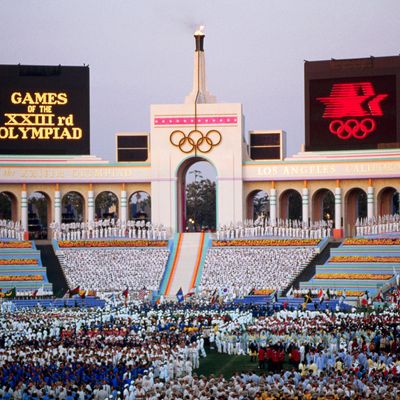
The Olympics are finally coming back the U.S. — in 11 years.
On Monday both the IOC and Los Angeles Olympic bid committee announced that the city has reached an agreement to host the 2028 games. The deal, which still has to be certified by the City Council, means the 2024 Games, which L.A. was originally angling for, will take place in Paris.
The 2028 Games will be the first Olympics in the U.S. since Salt Lake City hosted the Winter Olympics on 2002, and the country’s first Summer Games since Atlanta hosted in 1996. This is the first time the IOC has awarded two different Olympics at the same time. The decision to do so was made in part because of a lack of interest from host nations. With both Paris and L.A. considered ideal cities for the Games, the IOC decided to award the Olympics to both. Paris was chosen for 2024 because the city insisted it could not host in 2028. The IOC was also reportedly keen on giving the Games to L.A. in a year when President Trump had no chance to still be in office.
Despite the enthusiasm for the officials announcing the news, there are plenty of doubts about bringing the Games to L.A. The group NOlympics LA explains:
Should L.A. host the Olympics, we will see wide-ranging human rights’ violations and the forfeiture of our city to the interests of contractors, developers, media corporations, and the special interests who designed the bid. Preparing for and hosting the Olympics will place unnecessary financial stress on the citizens of L.A. while also disrupting the lives of the several million people who live and work here.
L.A. mayor Eric Garcetti has tried to beat back skepticism by assuring Angelenos that the Games will be privately funded. Of course, both the city and state of California has pledged a quarter billion dollars each to potential cost overruns. Garcetti says the project won’t need the money, but the 11 years between the awarding of the Games and the Opening Ceremony provide a lot of time for a lot to go wrong.
One of the reasons L.A. expects to pull this off without too much financial difficulty is the city’s existing athletic infrastructure, which should allow it to host the games in stadiums and arenas that already exist. The IOC liked this because it eliminates the possibility of abandoned stadiums six months after the Games. But the surfeit of venues in L.A. does not meant that the Olympics will arrive without major infrastructure projects. Efforts to expand the city’s rail lines and renovate its airport have been accelerated by the Olympic bid.
Los Angeles has also struck a deal with the IOC to receive an interest-free loan that will cover the organizing committee’s operating costs and go toward youth sports in the city. Typically, this money doesn’t flow from the IOC to the host city “until a couple of years before the opening ceremony,” the L.A. Times says.
“This agreement with the IOC will allow us to seed a legacy of hope and opportunity that will lift up every community in Los Angeles — not in 11 years’ time, but starting now and continuing in the years leading up to the Games,” Garcetti said in a statement Monday. “L.A. 2028 will kick-start our drive to make L.A. the healthiest city in America, by making youth sports more affordable and accessible than ever before.”





























